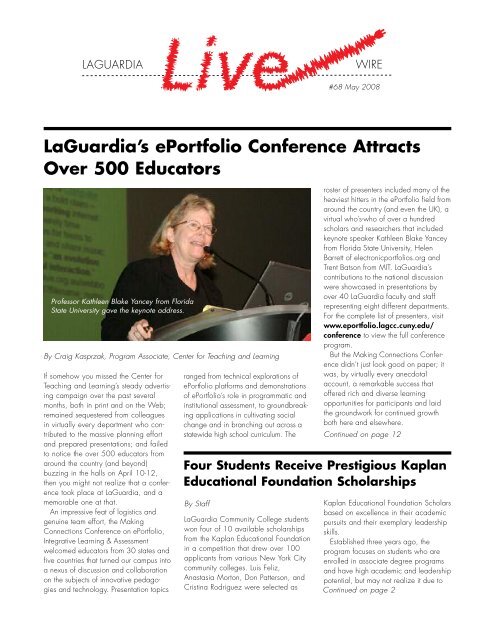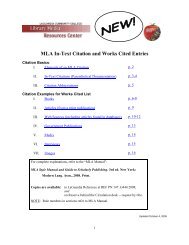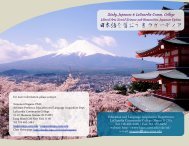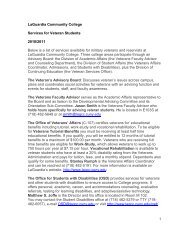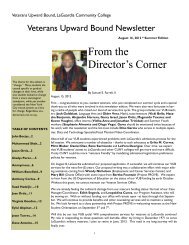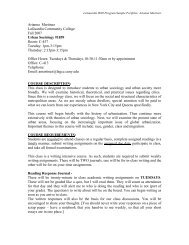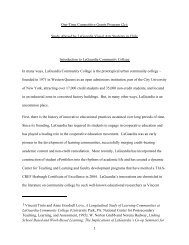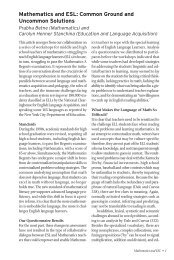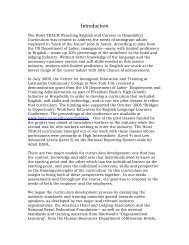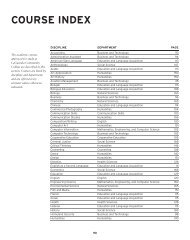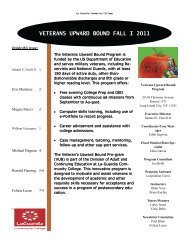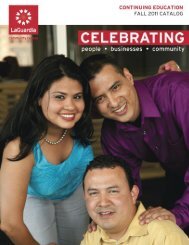LiveWire 68 - LaGuardia Community College - CUNY
LiveWire 68 - LaGuardia Community College - CUNY
LiveWire 68 - LaGuardia Community College - CUNY
You also want an ePaper? Increase the reach of your titles
YUMPU automatically turns print PDFs into web optimized ePapers that Google loves.
LAGUARDIA<br />
WIRE<br />
#<strong>68</strong> May 2008<br />
<strong>LaGuardia</strong>’s ePortfolio Conference Attracts<br />
Over 500 Educators<br />
Professor Kathleen Blake Yancey from Florida<br />
State University gave the keynote address.<br />
By Craig Kasprzak, Program Associate, Center for Teaching and Learning<br />
If somehow you missed the Center for<br />
Teaching and Learning’s steady advertising<br />
campaign over the past several<br />
months, both in print and on the Web;<br />
remained sequestered from colleagues<br />
in virtually every department who contributed<br />
to the massive planning effort<br />
and prepared presentations; and failed<br />
to notice the over 500 educators from<br />
around the country (and beyond)<br />
buzzing in the halls on April 10-12,<br />
then you might not realize that a conference<br />
took place at <strong>LaGuardia</strong>, and a<br />
memorable one at that.<br />
An impressive feat of logistics and<br />
genuine team effort, the Making<br />
Connections Conference on ePortfolio,<br />
Integrative Learning & Assessment<br />
welcomed educators from 30 states and<br />
five countries that turned our campus into<br />
a nexus of discussion and collaboration<br />
on the subjects of innovative pedagogies<br />
and technology. Presentation topics<br />
ranged from technical explorations of<br />
ePortfolio platforms and demonstrations<br />
of ePortfolio’s role in programmatic and<br />
institutional assessment, to groundbreaking<br />
applications in cultivating social<br />
change and in branching out across a<br />
statewide high school curriculum. The<br />
roster of presenters included many of the<br />
heaviest hitters in the ePortfolio field from<br />
around the country (and even the UK), a<br />
virtual who’s-who of over a hundred<br />
scholars and researchers that included<br />
keynote speaker Kathleen Blake Yancey<br />
from Florida State University, Helen<br />
Barrett of electronicportfolios.org and<br />
Trent Batson from MIT. <strong>LaGuardia</strong>’s<br />
contributions to the national discussion<br />
were showcased in presentations by<br />
over 40 <strong>LaGuardia</strong> faculty and staff<br />
representing eight different departments.<br />
For the complete list of presenters, visit<br />
www.eportfolio.lagcc.cuny.edu/<br />
conference to view the full conference<br />
program.<br />
But the Making Connections Conference<br />
didn’t just look good on paper; it<br />
was, by virtually every anecdotal<br />
account, a remarkable success that<br />
offered rich and diverse learning<br />
opportunities for participants and laid<br />
the groundwork for continued growth<br />
both here and elsewhere.<br />
Continued on page 12<br />
Four Students Receive Prestigious Kaplan<br />
Educational Foundation Scholarships<br />
By Staff<br />
<strong>LaGuardia</strong> <strong>Community</strong> <strong>College</strong> students<br />
won four of 10 available scholarships<br />
from the Kaplan Educational Foundation<br />
in a competition that drew over 100<br />
applicants from various New York City<br />
community colleges. Luis Feliz,<br />
Anastasia Morton, Don Patterson, and<br />
Cristina Rodriguez were selected as<br />
Kaplan Educational Foundation Scholars<br />
based on excellence in their academic<br />
pursuits and their exemplary leadership<br />
skills.<br />
Established three years ago, the<br />
program focuses on students who are<br />
enrolled in associate degree programs<br />
and have high academic and leadership<br />
potential, but may not realize it due to<br />
Continued on page 2
Kaplan scholars Luis Feliz, Anastasia Morton & son Brendon, Don Patterson and Cristina Rodriguez<br />
Kaplan Scholars...<br />
Continued from page one<br />
limited resources, support and guidance. To<br />
ensure the students’ academic success, the<br />
scholarship will not only provide them with<br />
financial support throughout their college<br />
experience, but also with academic assistance<br />
in the form of individual and group<br />
tutoring through the completion of their<br />
bachelor’s degrees, leadership development<br />
training and cultural enrichment.<br />
S T U D E N T P R O F I L E S<br />
Luis Feliz<br />
A native of the Dominican Republic, Luis<br />
immigrated to the United States with his<br />
mother and sister when he was seven<br />
years-old. His mother was looking for<br />
steady employment and a better life for her<br />
children, but life proved to be difficult.<br />
Although she was working two jobs, his<br />
mother could not adequately care for Luis;<br />
she sent him to live with his grandmother in<br />
the Dominican Republic. Luis’s education<br />
was sorely affected as a result of the constant<br />
moves. “The comings and goings held<br />
me back academically,” he says.<br />
He returned to the United States in 2000,<br />
but his schooling was still off track. Through<br />
eighth grade, he worked forty hours a week<br />
at a bakery and in the tenth grade he was<br />
working in an airport in lieu of attending<br />
classes. At the age of 20 he was still in<br />
high school when a guidance counselor<br />
suggested he drop out and enroll in a GED<br />
program. Her suggestion motivated him to<br />
reverse his academic fate, and by the end<br />
of his senior year he was taking honors<br />
classes.<br />
His goal was now to attend college, but<br />
his improved grades were not high enough<br />
for him to gain acceptance to a four-year<br />
college so he decided to enroll at<br />
<strong>LaGuardia</strong>. “I was shooting for a four-year<br />
school,” he says, “but I realized that the<br />
only chance for a better life was to begin<br />
my college experience at a community<br />
college.”<br />
The 22 year-old enrolled in the spring of<br />
2007 as a liberal arts major and says he<br />
soon realized he made the right college<br />
choice. “What I discovered is that community<br />
colleges are truly communities. Here at<br />
<strong>LaGuardia</strong> I met faculty who motivated me<br />
and students who reached out to me. Without<br />
the professors and friends who believed<br />
in me and encouraged me, the Kaplan<br />
scholarship would not have been possible.”<br />
In this community, Luis is an honor student<br />
who has been maintaining a 3.77 G.P.A.<br />
Luis also established himself as a student<br />
leader. He joined the Phi Theta Kappa<br />
Honor Society where he serves as publications<br />
officer. His love for literature prompted<br />
him to found the Renaissance Reading<br />
Circle where he and other students meet<br />
once a week to discuss such works as Franz<br />
Kafka’s Metamorphosis and Jose Saramago’s<br />
Blindness.<br />
Off campus he volunteers his services at<br />
the New Immigrant <strong>Community</strong> Empowerment<br />
organization where he teaches ESL<br />
classes to working class immigrants.<br />
With Kaplan’s academic and financial<br />
support, Luis hopes that he will be better<br />
prepared to succeed at a senior college. “I<br />
am excited about the scholarship and I<br />
know I will have to work harder than I have<br />
ever worked before. I’m looking forward to<br />
the tutoring and other assistance the<br />
program provides,” he says. “I want to work<br />
with them to become a better student.”<br />
With the help of the Kaplan scholarship,<br />
Luis envisions pursuing a baccalaureate in<br />
the classics at Cornell, Swarthmore or the<br />
University of Pennsylvania. “My dream is to<br />
go to an Ivy League school,” he says. “I<br />
hope the Kaplan Leadership Program will<br />
help put that within my grasp.”<br />
Ultimately, he would like to obtain a Ph.D.<br />
in English and teach at the college level.<br />
“I would like to bring the enriching experience<br />
I have found in books to community<br />
college students,” he explains.<br />
Continued on next page<br />
I S P R O D U C E D B Y T H E D E PA R T M E N T<br />
O F MARKETING & COMMUNICATIONS.<br />
QUESTIONS MAY BE DIRECTED TO RANDY<br />
FADER-SMITH AT x5985; EMAIL ARTICLES:<br />
RANDYFS@LAGCC.<strong>CUNY</strong>.EDU<br />
Our next issue will be in June 2008.<br />
The deadline for submissions is May 15.<br />
2 www.laguardia.edu
Kaplan Scholars...<br />
Continued from previous page<br />
Anastasia Morton<br />
To say that Anastasia has a busy schedule<br />
would be an understatement. She is a single<br />
mother, a full-time student in<br />
<strong>LaGuardia</strong>’s tuition-free Accelerated Study<br />
in Associate Program (ASAP) and a full-time<br />
school aide at a middle school in Harlem.<br />
“On Tuesdays and Thursdays, I drop off my<br />
son at day care, go to work, pick him up<br />
in the evening, then drop him off at<br />
<strong>LaGuardia</strong>’s child care center, and attend<br />
class,” says Anastasia. “On Saturdays, I<br />
attend class all day while Brendon is at the<br />
child care center.”<br />
Although she will continue her tiring<br />
routine, she is confident she will be able to<br />
obtain her bachelor’s degree with the help<br />
of the Kaplan scholarship. “Without barriers<br />
I will be able to focus on school, and work<br />
on completing my degree sooner,” she<br />
explains. “I am eager to begin the program<br />
that will give me time for learning.”<br />
The 27 year-old, who lives with her son in<br />
the Queensbridge housing project, says the<br />
reason she decided to go back to school<br />
after a 10 year hiatus was her four year-old<br />
son, Brendon. “I want to be able to establish<br />
a stable home environment for him,”<br />
says Anastasia. “I want a better paying job<br />
and more time to devote to him.”<br />
Despite these challenges, the liberal arts<br />
major maintains a 3.79 G.P.A., and ASAP<br />
eases the financial burdens tied to a college<br />
education by paying for tuition and books<br />
and providing a Metrocard. Its flexible structure<br />
also allows her to take evening classes<br />
so that she can work during the day.<br />
At her day job as a teacher’s school aide<br />
at the Wadleigh Secondary School in<br />
Harlem, Anastasia helps out in the classroom<br />
and the school office. Additionally she<br />
has developed a number of leadership<br />
workshops designed to help the black male<br />
students. “Many of these kids have leadership<br />
qualities, but they do not see it in themselves,”<br />
she says.<br />
Her work with these students has helped<br />
define her academic and career goals:<br />
pursue a bachelor’s degree in political<br />
science or urban studies and continue<br />
serving that specific population.<br />
“Now with the Kaplan scholarship, I will<br />
be able to get a bachelor’s degree,” she<br />
says.<br />
Don Patterson<br />
At the end of eighth grade Don felt that<br />
school had nothing to offer him so he<br />
dropped out and spent the next six years<br />
gaining what he described as “life experiences”<br />
on the streets of Bedford-Stuyvesant<br />
in Brooklyn. “I was a hooligan,” he says,<br />
admitting that his role models were neighborhood<br />
thugs, drug dealers and ex-convicts.<br />
“I had developed a distorted sense of<br />
ethics, morality and logic throughout my<br />
childhood and adolescence.”<br />
But when he saw many of his role models<br />
and family members end up in jail and<br />
observed his neighborhood going through<br />
gentrification, he realized that he, too, had<br />
to change. So at the age of 19, he enrolled<br />
in a GED program where he went on to<br />
receive his high school equivalency<br />
diploma, and one year later, in the fall of<br />
2006, he enrolled in <strong>LaGuardia</strong>.<br />
Leaving his past behind, Don began his<br />
career at <strong>LaGuardia</strong> and immediately distinguished<br />
himself as an outstanding scholar<br />
and consummate student leader. The liberal<br />
arts, math and science major maintains a<br />
3.5 G.P.A. and is active in many student<br />
organizations. He serves as the Phi Theta<br />
By Staff<br />
The Phi Theta Kappa International Honor<br />
Society selected <strong>LaGuardia</strong> student Maria<br />
Rexhammer as a member of the prestigious<br />
2008 All-New York Academic team for her<br />
outstanding scholarship, leadership, and<br />
service to the college. Maria joined the<br />
20-person second team, made up of the<br />
best and brightest community college<br />
students in the state. The highly competitive<br />
statewide academic contest, which is sponsored<br />
by the New York <strong>Community</strong> <strong>College</strong><br />
Trustees, The Association of Presidents of<br />
Public <strong>Community</strong> <strong>College</strong>s, the Faculty<br />
Council of <strong>Community</strong> <strong>College</strong>, and the Phi<br />
Theta Kappa International Society, attracted<br />
over 1,400 students from New York State<br />
community colleges.<br />
Kappa Honor Society’s liaison to the<br />
Student Advisory Council, an executive<br />
student senator and a student governor of<br />
public relations. In the community, he is a<br />
volunteer for the Black Male Empowerment<br />
Cooperative where he works with black<br />
youth. “My background has allowed me to<br />
help others like me,” he explains.<br />
The Kaplan scholarship will help Don<br />
reach his academic goal of majoring in<br />
economics. “Seeing professionals of different<br />
ethnic and socio-economic backgrounds<br />
buying and renting random properties in the<br />
area helped me decide to study economics,”<br />
he explains. “And the scholarship can help<br />
make it happen. I am no longer limited to<br />
city or state universities. I have the ability to<br />
attend universities such as The London<br />
School of Economics, NYU’s Stern School of<br />
Business, Morehouse <strong>College</strong> or Clark<br />
Atlanta University where I can get a chance<br />
to show just how diligent I am.”<br />
Cristina Rodriguez:<br />
After graduating from high school in 2004,<br />
Cristina said she did not have the financial<br />
means to enroll in college. “I could not<br />
afford tuition on my own,” she said, “and<br />
Continued on page 4<br />
<strong>LaGuardia</strong> Student Awarded by Phi Theta<br />
Kappa International Honor Society<br />
“Maria is an outstanding student scholar<br />
and a community leader who selflessly<br />
served the college,” said President Gail O.<br />
Mellow. “Her achievement is a testament to<br />
the college’s nurturing environment and the<br />
faculty and staff’s strong commitment to help<br />
students develop the knowledge and skills<br />
they need to succeed in life.”<br />
As an international student who emmigrated<br />
from Sweden in 2006, the 29 year-old<br />
scholar said she decided to enroll at<br />
<strong>LaGuardia</strong> that spring because of its<br />
academic reputation and its diversity. “As<br />
an international student, I wanted to be<br />
surrounded by students who share the same<br />
experiences,” she explains.<br />
Continued on page 4<br />
3
Kaplan Scholars...<br />
Continued from page 3<br />
my parents would not support me<br />
because they thought I would fail.”<br />
For the next three years, Cristina<br />
worked at various odd jobs until she<br />
saved enough money to secure a loan,<br />
and in the spring of 2007 enrolled in<br />
<strong>LaGuardia</strong>’s business administration<br />
program. After she completed the spring<br />
semester, she learned about the college’s<br />
tuition-free Accelerated Study in Associate<br />
Program, (ASAP); she applied and<br />
was accepted.<br />
Cristina excelled in her classes, maintaining<br />
a 3.4 G.P.A., but when troubles<br />
at home affected her grades, she began<br />
to doubt whether she should continue<br />
her studies. “But with the support of<br />
ASAP faculty I decided to push on,” she<br />
says.<br />
She is now back on track, taking<br />
honors courses and striving to get her<br />
G.P.A. up to a 3.5 so that she can join<br />
the Phi Theta Kappa Honor Society. She<br />
is also a student technology mentor who<br />
helps students with computer programs.<br />
“I really like working with students,” she<br />
says. “Helping them pushes me to keep<br />
on going.”<br />
For the student scholar, the benefits of<br />
the Kaplan program are significant. “The<br />
Kaplan Scholarship is not only important<br />
because it will pay for school and<br />
books, but the staff actually dedicates<br />
their time and effort,” she said. “It is<br />
almost like ASAP but now it is for a four<br />
year college. It is like family. They care<br />
about you and are interested in the<br />
things you are doing in school and in<br />
your life.”<br />
Before receiving the scholarship,<br />
Cristina had planned on applying to<br />
Baruch, Columbia or NYU, but she says<br />
Kaplan has encouraged her to keep her<br />
options open. Wherever she ends up<br />
she plans on majoring in business<br />
administration, but she has a long list of<br />
possible career options.<br />
“I would like to get a Ph.D. in business<br />
and teach,” she said, “but I also would<br />
like to start a nonprofit organization that<br />
helps kids prepare for the outside<br />
world.” ◗<br />
Team Winner...<br />
Continued from page 3<br />
<strong>LaGuardia</strong> student Maria Rexhammar was<br />
selected as a member of the 2008 All-New<br />
York Academic Team.<br />
The liberal arts major immediately distinguished<br />
herself as an outstanding student;<br />
she graduated last December with a near<br />
perfect 3.96 G.P.A.<br />
Maria also played an active leadership<br />
role on campus. She served as treasurer of<br />
Phi Theta Kappa Honor Society. During her<br />
stint as financial officer, the chapter was<br />
granted the largest allocation in its history,<br />
partly due to the solid budget she developed<br />
and her success in lobbying for chapter<br />
funding.<br />
Her concern for environmental issues<br />
prompted her to volunteer her services to the<br />
Save the Earth film and discussion series.<br />
She also became involved in “Operation<br />
Green”—a PTK green project—where she<br />
participated in presentations on sustainable,<br />
environmentally-friendly solutions to daily<br />
energy use.<br />
She also took part in a successful collegewide<br />
book drive, which collected over<br />
1,600 books that were distributed to<br />
schools in West Africa.<br />
Although all her extracurricular activities<br />
tested her academic and leadership skills,<br />
she says the one that stands out is her<br />
internship at the Office of the Public<br />
Advocate Betsy Gotbaum, which is offered<br />
through the City of University of New York<br />
Women’s Public Leadership Program. Maria<br />
was one of 17 <strong>CUNY</strong> students selected to<br />
participate in the highly competitive program.<br />
As a member of the Ombudsman Services,<br />
Maria was part of a team that helped people<br />
get assistance dealing with problems with city<br />
services.<br />
“My goal is to use my education to benefit<br />
society,” said Maria. “The internship program<br />
allowed me to work with people and help<br />
them solve their problems. Not only have I<br />
been able to fulfill one of my goals as a result<br />
of my education, but I have also gained valuable<br />
knowledge from my internship that I will<br />
be able to use in my future career.”<br />
Currently pursuing a bachelor’s degree in<br />
political science at Hunter <strong>College</strong>, Maria is<br />
one step closer to that future career: law. ◗<br />
<strong>LaGuardia</strong>’s Full<br />
Professor Salaries<br />
Are Among Highest<br />
in Nation<br />
By Staff<br />
<strong>LaGuardia</strong> is the fourth highest payer of<br />
salaries for full professors among the<br />
nation’s community colleges, according to<br />
a report by the American Association of<br />
University Professors (AAUP). The report<br />
indicated <strong>LaGuardia</strong>’s average salary for<br />
full professors is $94,800.<br />
Among the other <strong>CUNY</strong> colleges,<br />
Queensborough <strong>Community</strong> <strong>College</strong><br />
ranked second with an average salary of<br />
$98,300; Hostos <strong>Community</strong> <strong>College</strong><br />
was third with an average salary of<br />
$97,900; Borough of Manhattan <strong>Community</strong><br />
<strong>College</strong> was seventh with an average<br />
salary of $92,900; and Bronx <strong>Community</strong><br />
<strong>College</strong> and Kingsborough <strong>Community</strong><br />
<strong>College</strong> tied for eighth place with an average<br />
salary of $92,000. Topping the list<br />
was Westchester <strong>Community</strong> <strong>College</strong> with<br />
$108,300.<br />
The AAUP survey only looked at full<br />
professor salaries.<br />
4 www.laguardia.edu
<strong>LaGuardia</strong>’s Founding President,<br />
Joseph Shenker, to be Honored<br />
at Fundraiser<br />
Measuring Affective<br />
Skill Development in<br />
Experiential Education<br />
By Francine White, Chairperson,<br />
Cooperative Education<br />
By Staff<br />
The <strong>LaGuardia</strong> <strong>Community</strong> <strong>College</strong><br />
Foundation will honor Dr. Joseph Shenker,<br />
the founding President of <strong>LaGuardia</strong>, at its<br />
2008 Innovative Leadership Award<br />
Reception on June 11.<br />
Dr. Shenker, who over his 18 yearlong<br />
tenure led the youngest <strong>CUNY</strong> community<br />
college to national prominence for its innovative<br />
teaching approaches and cooperative<br />
education program, will receive the<br />
2008 Innovative Leadership Award. He will<br />
be the first recipient of the award, which<br />
recognizes a leader or an advocate who<br />
has made significant contributions to<br />
education. The award will be presented<br />
each year at the fundraising event.<br />
In accepting the honor, Dr. Shenker<br />
requested that the event be used as an<br />
opportunity to raise funds for student scholarships.<br />
Heeding the request, the Foundation<br />
kicked off its fund-raising efforts in<br />
March by reaching out to Foundation board<br />
members, faculty and staff, alumni and local<br />
businesses. As a result of its campaign, the<br />
fund-raising reception has already raised<br />
over $100,000, three times the contributions<br />
from past years’ events.<br />
The Foundation expects to have 200<br />
people attending the reception, which will<br />
be held at the law offices of Ropes & Gray,<br />
where foundation trustee Robert C. Morgan<br />
is a partner. Among the invited guests are<br />
<strong>LaGuardia</strong> faculty and staff who were at the<br />
college when Dr. Shenker was President, as<br />
well as <strong>CUNY</strong> staff members who worked<br />
with him. Also attending will be studentscholarship<br />
recipients. “We wanted to have<br />
the donors meet the students so they can<br />
understand how much the support they provide<br />
impacts students’ lives,” said Angela<br />
Wambugu Cobb, Director of Development.<br />
Dr. Joseph Shenker, <strong>LaGuardia</strong>’s<br />
founding president<br />
Dr. Shenker was 30-years old when he<br />
was appointed President of <strong>Community</strong><br />
<strong>College</strong> IX, which was renamed <strong>LaGuardia</strong><br />
<strong>Community</strong> <strong>College</strong>, in 1970. For the next<br />
18 years, he led the college’s evolution into<br />
a respected and innovative community<br />
college. He also founded Middle <strong>College</strong><br />
High School, the first public high school for<br />
at-risk youth, and its sister school, International<br />
High School.<br />
Believing that community colleges should<br />
play an important role in continuing education,<br />
he established the college’s Division for<br />
Adult and Continuing Education. Among the<br />
continuing education programs established<br />
during his tenure was one of the nation’s first<br />
college-level programs for deaf adults.<br />
Dr. Shenker left <strong>LaGuardia</strong> in 1988 to<br />
serve as President of Bank Street <strong>College</strong> of<br />
Education. After leading the highly<br />
respected teachers college for seven years,<br />
he accepted the position of Provost of C.W.<br />
Post <strong>College</strong>. He will be retiring this<br />
summer.<br />
This fall I presented a research idea at The<br />
World Association of Cooperative<br />
Education. The idea is to use our traditional<br />
employer evaluation form to design a pre<br />
and post internship evaluation form to<br />
gauge both student and employer perceptions<br />
of affective skill preparedness, performance<br />
and growth during the internship<br />
experience.<br />
The purpose of the project is to begin<br />
addressing research deficiencies in the area<br />
of affective skill development and experiential<br />
learning. While we know that internships<br />
help students to develop both<br />
cognitive and affective skills, we are not<br />
very good at measuring the affective skill<br />
development. Current literature confirms that<br />
these are needed skills to make students<br />
workplace ready because employers say<br />
so. The affective skills that employers are<br />
looking for include: communication listening,<br />
oral, written and interpersonal; selfmanagement<br />
and self-motivation; cultural<br />
sensitivity; planning and organizing; problem-solving<br />
and reasoning; and life-long<br />
learning and teamwork skills.<br />
Traditionally, cooperative education used<br />
an employer evaluation to determine the<br />
level of skill building on internships as determined<br />
only by the employer. The modified<br />
evaluation process will collect pre and post<br />
evaluations from both students and employers.<br />
Results will then be compared to determine<br />
if a correlation exists between what<br />
employers think of student affective skill<br />
preparation, performance and growth and<br />
what students think of their own affective<br />
skill preparation, performance and growth.<br />
The next step will be to help students identify<br />
affective skill development in their learning<br />
objectives and to test to see if those<br />
objectives have been met and how.<br />
5
All Stories Do Not Get Told: Earl Caldwell at<br />
<strong>LaGuardia</strong><br />
only could they not force me before a grand<br />
jury investigating my sources, but that I<br />
By Victor Rosa, Lecturer, English<br />
Department<br />
At the English Department’s Black Literature<br />
Committee meeting on April 17, legendary<br />
journalist, Earl Caldwell, the only reporter<br />
present at the Lorraine Motel in Memphis<br />
on the day Dr. Martin Luther King, Jr. was<br />
assassinated, explained to a captivated<br />
audience of <strong>LaGuardia</strong> students and faculty<br />
how he reported on this devastating<br />
moment in history.<br />
“In the ‘60s, when I covered the riots, I<br />
used to meet people who said, ‘you should<br />
have been here last night and seen what<br />
happened,’” he said to an overflowing<br />
crowd. “’You should have been here this<br />
afternoon. You’re always coming after whatever<br />
it is has happened, so you don’t<br />
know.’” He went on to say, “It happened for<br />
me on the first week of April 19<strong>68</strong>, twilight<br />
over the Lorraine Motel in Memphis, and I<br />
got as close to being there as a reporter<br />
ever does, at the assassination of Martin<br />
Luther King, Jr.”<br />
Looking back on the day of the assassination,<br />
Mr. Caldwell, who was then a reporter<br />
for The New York Times, said that when he<br />
heard the fatal shot, he was in his room just<br />
below the balcony where Dr. King was<br />
killed. As he stood in the doorway of his<br />
room, “I see this figure directly across from<br />
me. This guy doing something…” a man in<br />
overalls, crouching in the thicket. The person<br />
he saw left right after the assassination.<br />
Neither the police, nor the FBI, ever asked<br />
him what he saw or ever conducted a doorto-door<br />
investigation at the motel, which is<br />
standard operating procedure in a case like<br />
this. He said that shortly after the assassination<br />
the thicket was “cut to the ground,” and<br />
when I told them what I saw in this thicket,<br />
they said, “What thicket are you talking<br />
about?”<br />
Mr. Caldwell believes that James Earl Ray,<br />
who pleaded guilty right after the shooting<br />
but later recanted, did not shoot Martin<br />
Luther King. Ray, sentenced to 99 years,<br />
died in prison and the case was never<br />
reopened.<br />
6 www.laguardia.edu<br />
Legendary journalist Earl Caldwell was the<br />
guest lecturer for the English Department’s<br />
Black Literature Committee meeting.<br />
He said he quit “the best job in journalism<br />
he ever had to tell this story of what<br />
happened to me.” He added: “We are in a<br />
period of time when people are saying:<br />
’Let’s be at peace with the official story.‘ But<br />
that is not easy to do.” He was there, Mr.<br />
Caldwell reminded the rapt audience, and<br />
“you cannot argue that I didn’t see what I<br />
saw.”<br />
Another story that must be told, Mr. Caldwell<br />
said, was about “one of the most<br />
important cases involving reporters’ rights to<br />
go to the Supreme Court, United States vs.<br />
Caldwell. The case involved the national<br />
police, the FBI, saying to me as a reporter<br />
assigned to cover the Black Panthers that<br />
you will be an undercover spy for us.”<br />
How am I going to be a reporter and a<br />
spy? Mr. Caldwell asked himself.<br />
He refused, was subpoenaed by a grand<br />
jury and asked to turn over his notes and<br />
tapes of interviews with the Panthers. He still<br />
would not budge and eventually it led to a<br />
landmark First Amendment case studied in<br />
journalism schools across the country.<br />
An untold part of the story, he said, is that<br />
it is not The New York Times that paid the<br />
court cost, as many believe, but rather the<br />
NAACP Legal Defense Fund.<br />
“We made this case and won it,” Mr.<br />
Caldwell said. “The United States Court of<br />
Appeals for the Ninth Circuit ruled that not<br />
didn’t have to answer the subpoena.”<br />
Although the case lost when it was<br />
appealed to the Supreme Court, it inspired<br />
the passage of state shield laws that offer<br />
varying protection from forced disclosure of<br />
a reporter’s sources.<br />
Mr. Caldwell started his career in 1959<br />
writing for the Clearfield Progress, his hometown<br />
paper in Clearfield, Pennsylvania.<br />
Later he joined the staff of the Democrat and<br />
Chronicle in Rochester, N.Y. In 1966, he<br />
went on to The New York Herald Tribune,<br />
and briefly The New York Post, before<br />
reporting for The New York Times.<br />
After his tenure at The New York Times,<br />
Mr. Caldwell wrote a column three times a<br />
week for the New York Daily News from<br />
1979 to 1994. He was the first black<br />
columnist for a major daily newspaper. Mr.<br />
Caldwell’s columns have been collected in<br />
Black American Witness: Reports from the<br />
Front (Lion House Publishing, 1995), and<br />
they “illuminate events in the lives of people<br />
both ordinary and famous. They constitute<br />
the most comprehensive record available of<br />
how American cities, children, unions,<br />
health care, police and race relations got to<br />
where they got today.”<br />
A recipient of the National Association of<br />
Black Journalists President’s Award, Mr.<br />
Caldwell is a founder of the Reporters<br />
Committee for Freedom of the Press.<br />
Currently, he is the writer-in-residence at the<br />
Scripps Howard School of Journalism and<br />
Communication at Hampton University. Mr.<br />
Caldwell is the host and producer of The<br />
Caldwell Chronicles, a radio program on<br />
WBAI-FM 99.5, which airs on Fridays from<br />
3-5 p.m.<br />
Jamie Davis, editor of <strong>LaGuardia</strong>’s student<br />
newspaper The Bridge, found Mr. Caldwell<br />
“charismatic and engaging” and said his<br />
talk featured topics “relevant to both faculty<br />
and students.” For Raquel Ramirez, president<br />
of the Web Radio Club, “it was very<br />
informative listening to someone who lived<br />
in that era talk about it, instead of reading<br />
about it. It gives it more feeling.”<br />
The program was also sponsored by The<br />
Bridge and the Web Radio Club.
Breaking Barriers for Women – Dr. M. Joycelyn<br />
Elders Speaks at <strong>LaGuardia</strong> Women’s Conference<br />
Dr. Joycelyn Elders<br />
By Vanessa M. Bing, Faculty Mentor,<br />
Student Center for Women<br />
The Student Center for Women and the<br />
Office of Student Life and Recreation, in<br />
conjunction with the Office of the President<br />
and the <strong>CUNY</strong> Women’s Leadership<br />
Initiative, hosted a day long conference to<br />
encourage the development of leadership<br />
skills in women. Healthy World, Healthy<br />
Communities, Healthy You was the theme<br />
of this follow-up training event held at<br />
<strong>LaGuardia</strong> on April 18 featuring former<br />
U.S. Surgeon General Dr. M. Joycelyn<br />
Elders, who gave a spirited and engaging<br />
keynote presentation: Breaking Barriers &<br />
Glass Ceilings: Women Leading for<br />
Change. This presentation set the tone for<br />
an event that featured prominent women<br />
leaders whose expertise in the area of<br />
health, education and business provided<br />
<strong>LaGuardia</strong> and other <strong>CUNY</strong> undergraduates<br />
an opportunity to learn from the best.<br />
Dr. Elders was an ideal speaker to lead<br />
the event, because she is a woman who has<br />
broken many barriers and whose life work<br />
has focused on bringing change and lifting<br />
communities. Dr. Elders became the<br />
fifteenth Surgeon General of the Public<br />
Health Service in 1993, appointed by President<br />
Clinton, and was the first African<br />
American woman to serve in this position.<br />
As Surgeon General, Dr. Elders was a<br />
leading spokesperson in the health care<br />
reform effort, attempting to lead the charge<br />
for universal health care coverage. Dr.<br />
Elders was a strong advocate for comprehensive<br />
health education, encouraging sex<br />
education in the schools for grades K-12. It<br />
was her outspoken views and controversial<br />
remarks about sex education that forced her<br />
resignation after only 15 months in office.<br />
Dr. Elders reminded students that just as she<br />
was challenged while holding the position<br />
of Surgeon General, so too will they be<br />
challenged in life.<br />
The conference format was designed to<br />
inspire women to challenge themselves to<br />
consider how they can make a difference –<br />
in their personal lives, in their communities<br />
and in the world. Dr. Elders’ address<br />
provided the right mix of humor, thoughtfulness,<br />
and insight designed to encourage<br />
our students to make a difference. Dr. Elders<br />
spoke of the need to continue to advocate<br />
and fight for universal health care coverage<br />
to keep all our citizens healthy, noting how<br />
poor women and children are largely<br />
affected by the lack of such coverage. In<br />
addressing ways<br />
women can take up this<br />
fight and lead for<br />
change, Dr. Elders<br />
discussed the various<br />
educational and access<br />
strategies needed to<br />
mobilize our communities.<br />
She highlighted<br />
several points, including<br />
the need to create financial<br />
access – making<br />
health care available to all; the need to<br />
create cultural access – being aware of<br />
different cultures and languages; the importance<br />
of providing intervention strategies –<br />
clear tools and methods to manage and<br />
control health problems; and the need to<br />
employ media and political strategies – the<br />
means of getting the message out and keeping<br />
the issue of health care on everyone’s<br />
agenda.<br />
Dr. Elders concluded by identifying some<br />
of the key leadership strategies that women<br />
need to assume in order to make a difference.<br />
To be a leader, she said, women need<br />
Former U.S. Surgeon General<br />
Dr. Jocelyn Elders encouraged<br />
the development of leadership<br />
skills in women in her keynote<br />
address. “The key is<br />
for women to not simply<br />
try to lead, but to become<br />
transformational leaders.”<br />
to be aware of the five C’s: clarity of vision,<br />
competence, consistency, commitment and<br />
the ability to exercise control. The key,<br />
according to Dr. Elders, is for women to not<br />
simply try to lead, but to become transformational<br />
leaders. In this, women were<br />
encouraged to learn, listen, and actively<br />
seek out mentors; to be aware and to show<br />
determination. “When dancing with a bear,<br />
you can’t get tired and sit down,” she said.<br />
The goal is to keep dancing so that the bear<br />
does not sit on you and crush you. Such<br />
metaphors were used to remind our students<br />
of the magnitude and weight of the many<br />
issues confronting women, while reminding<br />
them that they have the ability to finesse a<br />
situation to make substantive changes.<br />
Following Dr. Elders’ keynote presentation,<br />
students attended workshops facilitated<br />
by Dr. Ann Webster of the Benson Henry<br />
Institute for Mind-Body Medicine at Massachusetts<br />
General Hospital; Dr. Jean Lau<br />
Chin, author of Women & Leadership:<br />
Transforming Visions and Diverse Voices<br />
(Wiley-Blackwell,<br />
2007); Trisha Scudder<br />
and Herma Schmitz of<br />
the Executive Coaching<br />
Group; Dr. Julieta<br />
Macias, founder and<br />
CEO of Macias Consulting,<br />
a human relations<br />
and executive life coaching<br />
firm in Rockville,<br />
MD.; and Marie-Lucie<br />
Brutus, MPH, of the<br />
Sophie Davis School of Biomedical<br />
Sciences at CCNY.<br />
As students went through the day in workshops<br />
and skill building sessions that<br />
focused on change and empowerment, they<br />
were encouraged to reflect on their own<br />
roles and level of activism. Through Dr.<br />
Elders’ words, students were able to envision<br />
how every little change they make can<br />
indeed make a difference, and have real<br />
impact on their individual lives as well as<br />
the world we live in; how little steps that we<br />
take today can lead to greater steps and<br />
transformations tomorrow.<br />
7
“CABARET” COMES TO LAGUARDIA<br />
By Staff<br />
The <strong>LiveWire</strong> sat down with some of the<br />
cast members of “Cabaret,” to discuss the<br />
play and their experiences. They were<br />
Veronica Palazzolo, who plays Sally<br />
Bowles; Darryl Sorrentino, who plays<br />
Clifford Bradshaw; Rashidah Fowler, who<br />
plays the MC; and Matthew Trzpis, who<br />
plays Ernst Ludwig. Professor Davis Henry<br />
Davis, who is directing the play, also sat in<br />
on the conversation.<br />
PROFESSOR DAVIS:<br />
These actors have worked a long time in<br />
the theater department, performed in many<br />
shows, so this is a culmination of their work<br />
here. We have been rehearsing “Cabaret”<br />
since September; they have had the opportunity<br />
to work intensely on the acting,<br />
singing and dancing as well as delve<br />
deeply into their characters.<br />
How did you prepare for the part?<br />
VERONICA:<br />
I read The Berlin Stories by Christopher<br />
Isherwood, researched online and watched<br />
interviews of people who portrayed Sally<br />
on Broadway. I also read the script several<br />
times: the first as a story to see how she<br />
interacts with other people; second, as<br />
Veronica to see how I would react to these<br />
situations; and then as Sally Bowles. From<br />
there I tried to find a midpoint between<br />
Veronica and Sally.<br />
DARRYL:<br />
I also read The Berlin Stories and did a lot<br />
of research on Christopher Isherwood, an<br />
English novelist who wrote about his travels<br />
to Germany. Because I believe the character<br />
of Cliff is Christopher, I wanted to learn<br />
as much as I could about the author. I also<br />
read the play and figured out how he<br />
would make those choices. I think I am<br />
going to get him.<br />
RASHIDAH:<br />
My experience has been different from<br />
Veronica’s and Darryl’s because when the<br />
8 www.laguardia.edu<br />
play was first rehearsed I was cast as a Kit<br />
Kat girl so all the research I had done was<br />
about cabarets in Berlin. A few months<br />
later when I got the role of the MC, I hadn’t<br />
read The Berlin Stories, and I hadn’t seen<br />
any other productions of “Cabaret”<br />
because I didn’t want to hinder how I<br />
would portray the character.<br />
Do you find it difficult playing a<br />
part that was written for a man?<br />
RASHIDAH:<br />
No. I have played male characters before<br />
in other productions. It wasn’t a big stretch.<br />
Are you able to relate to your<br />
character?<br />
VERONICA:<br />
She has a dream, a passion. She is very<br />
ambitious and driven. She wants to be star,<br />
an actress, and so do I. So I can relate to<br />
that. And she is very vulnerable. She did<br />
not know or care about politics in Berlin,<br />
which led to her damnation. I am vulnerable,<br />
too, because all I know is about acting.<br />
The question of Cliff’s sexuality<br />
comes up.<br />
PROFESSOR DAVIS:<br />
Cliff Bradshaw’s sexuality is an interesting<br />
point because as they worked on the musical<br />
the nature of his sexuality evolved. In<br />
1966, when they premiered the show on<br />
Broadway, he was a heterosexual character.<br />
Then in the revival in 1984, he<br />
became a homosexual character.<br />
DARRYL:<br />
I look at him as a homosexual because I<br />
based my character on Christopher<br />
Isherwood who was a homosexual.<br />
PROFESSOR DAVIS:<br />
Other characters try to define his sexuality<br />
for him. He clearly has had some homosexual<br />
encounters but there is no sense that he<br />
feels comfortable being a homosexual or<br />
that he is committed to being a homosexual.<br />
The play touches upon some very<br />
sensitive subjects: Nazism, homosexuality.<br />
How was it viewed when<br />
it came out?<br />
PROFESSOR DAVIS:<br />
It was considered very bold and it was one<br />
of the first concept musicals, meaning a<br />
musical with a central idea or theme which<br />
is reinforced through direction, the designs,<br />
and the music and dialogue, all combining<br />
to create a powerful effect on the audience.<br />
For example, there is a special relationship<br />
between the numbers in “Cabaret” and the<br />
scenes. The numbers seem to comment on<br />
the scenes and the scenes seem to comment<br />
on the numbers.<br />
What is the purpose of the cabaret<br />
in 1930s Berlin?<br />
VERONICA:<br />
The Kit Kat Klub is entertainment but also<br />
propaganda. It is telling people, ‘don’t<br />
look over there, look over here.’ It is blinding<br />
them with what the club wants them to<br />
see, which are girls dancing around, hiding<br />
the truth from people.<br />
PROFESSOR DAVIS:<br />
One can argue that today’s media outlets,<br />
like the cabarets, are distracting us. We<br />
think the media is informing us, but it is<br />
also diverting us from looking at something<br />
closely. And that is really the core of the<br />
play. The play asks the question, “If something<br />
horrible is happening around you,<br />
what are you going to do about it? Are<br />
you going to just continue with your life as<br />
before or will you actually react and take a<br />
stand?”<br />
Do the characters take a stand?<br />
RASHIDAH:<br />
Cliff takes a stand. Sally takes a stand.<br />
VERONICA:<br />
I do. I decide to stay and die for what I<br />
believe in.<br />
Continued on next page
Cabaret...<br />
Continued from previous page<br />
DARRYL:<br />
That is not a stand. It is a fall.<br />
VERONICA:<br />
No it is a stand. She is not going to go to<br />
Cliff’s world, to America. She doesn’t<br />
believe in that. She went to Berlin to follow<br />
her dreams and no matter what the cost<br />
she is going to stay there.<br />
So what happened to Sally?<br />
PROFESSOR DAVIS:<br />
We don’t know, although there is a clue in<br />
the song “Cabaret,” which is one of the<br />
most famous theater songs ever written. In<br />
the song, Sally sings about her friend, Elsie.<br />
DARRYL<br />
VERONICA:<br />
Elsie was a former Kit Kat girl who went to<br />
Berlin with her and died of a drug overdose.<br />
Sally sings that she looked so peaceful in<br />
her coffin that she is going to go like her.<br />
PROFESSOR DAVIS:<br />
I think Christopher Isherwood never knew<br />
what happened to the real Sally Bowles.<br />
This character just disappeared from history.<br />
Matthew Trzpis, who plays the shadowy<br />
character of Ernst Ludwig, joins the<br />
conversation.<br />
What happened to your character?<br />
VERONICA<br />
MATT:<br />
With Ernst, it’s just the opposite! My character<br />
succeeds in the end because he gets<br />
what he wants, which are the Nazis coming<br />
to power.<br />
RASHIDAH:<br />
Ultimately, Ernst is the only one who gets<br />
what he wants. Sally decides to stay, but<br />
with everything she knows falling apart in<br />
Germany, she will never be that big star.<br />
Cliff wants Sally to go back to America<br />
with him and he does not get what he<br />
wants. And the MC just wants to sleep<br />
around and perform and he does not get<br />
what he wants.<br />
PROFESSOR DAVIS:<br />
When Hitler came to power three years<br />
later in 1933 the cabarets were all closed<br />
down. No one could do satire. No one<br />
could make fun of the government. So…<br />
RASHIDAH:<br />
The MC ends up where everyone else ends<br />
up. It is very odd to do this part because it<br />
is usually played by Caucasian men and I<br />
am a black woman. In 1930s Berlin I am<br />
sure I would be shipped away somewhere<br />
or imprisoned like many people. By the<br />
end of the play, the MC’s spirit is gone.<br />
How would you sum it all up?<br />
VERONICA:<br />
Doing this play was a dream come true.<br />
PROFESSOR DAVIS:<br />
And I have to live with it.<br />
Laughter ◗<br />
RASHIDAH<br />
MATT<br />
9
Students’ Essays Recognized<br />
Two students from the Adult Learning<br />
Center had their essays chosen to be<br />
published, from hundreds of submissions,<br />
in the journal, Literacy Review. The journal<br />
is a Gallatin Writing Program<br />
Publication of New York University.<br />
Lalawatie Dupa, in “Struggling with Our<br />
Lives to Make Ends Meet,” wrote about<br />
her difficulties growing up in Guyana,<br />
remembering poverty, hunger and humiliation,<br />
hard childhood work on a farm,<br />
feeling numb from carrying heavy loads,<br />
and her hopes for a better life in<br />
America. Nohel Marte, in “This Crazy<br />
World,” looked at the shattered dreams<br />
in his East New York neighborhood in<br />
Brooklyn, seeing the failed lives that glorify<br />
violence, greed, guns and drugs, his<br />
personal struggle to break out, and his<br />
vow to make better choices for a better<br />
future. Both student authors will be honored<br />
at a celebration in May at NYU,<br />
along with their instructor, Miriam Fisher.<br />
Lalawatie Dupa<br />
Struggling with Our Lives to<br />
Make Ends Meet<br />
By Lalawatie Dupa<br />
These are some memories of growing up in<br />
Guyana.<br />
Once me and my sister ran away from our<br />
mother because we used to work so hard,<br />
and we were just children. When we<br />
planted crops we had to carry the load to<br />
the road to sell it with my two younger<br />
brothers. A man used to buy our load,<br />
vegetables and greens. The man had a<br />
truck. He passed at 8 o’clock in the morning<br />
two times a week. We had to wake up<br />
at 2 o’clock in the morning and carry the<br />
load to the road by 8 o’clock. We carried it<br />
on our heads, eight or 10 bags. They were<br />
very big bags. We had to walk about three<br />
miles to the road. We had to go back and<br />
forth until we finished the load. When we<br />
finished we didn’t feel our heads. They<br />
were so numb.<br />
At times when everybody was sleeping in<br />
the night we had to work. Other times we<br />
started to pick the vegetables and greens in<br />
the afternoon before the sun went down,<br />
then we had to start to fetch the load in the<br />
night. Often we finished about 12 o’clock<br />
or 1 o’clock in the night. Sometimes we<br />
might leave home at 4 o’clock or 5 o’clock<br />
in the morning to work in our farming land.<br />
We left home before daybreak, my mother,<br />
me, and my two younger brothers. Some<br />
days we did not see daybreak at home for<br />
one or two months. We left early in the<br />
morning when it was still dark and came<br />
back very late in the night. Why did we<br />
leave so early? It was because the sun got<br />
hot and we did a lot of work in the morning<br />
early.<br />
There were days my mother left my older<br />
sister home to cook food for all of us.<br />
My two younger brothers had to walk<br />
back home to get the food. On their way<br />
coming back to the farm with the food some<br />
cowboys stopped my two brothers and ate<br />
our food. My brothers came back to the<br />
farm crying and told my mom what<br />
happened to them. So the next day they<br />
went back home to get the food. Then me<br />
and my mother went and hid in the bushes<br />
where the cowboys were waiting for my<br />
two brothers to beat them up and take<br />
away the food. They said “Ha, ha, you two<br />
little boys. Hope you got good food today<br />
to eat or we will beat you two up very bad!<br />
OK!” Then me and my mother came out<br />
from the bush. When they saw us they got a<br />
shock! Then they got angry. My mother said<br />
to them, “Yes, good food, you all come and<br />
have it!” They ran away and never took the<br />
food again.<br />
But from that day when we planted crops<br />
we never reaped a good crop. We always<br />
planted the best crops. People were jealous<br />
of us because we had the best crops. We<br />
were victimized by some cowboys for many<br />
years. They never let us reap our crops<br />
again. They started to graze down our<br />
crops. Some days the cowboys broke the<br />
fences and chased their cows and horses<br />
into our farm. Their animals would eat up<br />
everything that we worked so hard for so<br />
many months.<br />
But after that we planted crops again and<br />
planted a lot of rice, too. Everybody<br />
finished cutting their rice with combine<br />
machines, but we had to cut our rice by<br />
hand with a grass knife. We were the last<br />
ones left in the field cutting our rice. I<br />
remember one year when our rice crop was<br />
the best of all the years. When we finished<br />
cutting our rice we carried all the rice and<br />
put it all in one place. My mother hired a<br />
tractor to mash the rice. The day before the<br />
tractor was to mash the rice, we left the field<br />
very late that night. We thought our rice<br />
crop was safe but it was not. The next day<br />
when we went back we only saw black and<br />
white ashes in the field. Someone had set a<br />
fire during the night. When we saw that we<br />
felt like dying. We started to hug each other<br />
and started to cry and cry. We lost the<br />
promise my mom made to us. She had told<br />
us that we had a good rice crop that year<br />
and that we would build a house to live in<br />
and then people would respect us again,<br />
that they would treat us like humans again.<br />
We were so happy when my mom told us<br />
Continued on next page<br />
10 www.laguardia.edu
Student Essays...<br />
Continued from previous page<br />
that, but everything turned out to be a worse<br />
nightmare.<br />
By the kind of hard work we did we<br />
should have been very rich by then, but we<br />
got hurt by some people. But there were<br />
other people, such as some neighbors, who<br />
were very nice to us.<br />
Some days my mother would tell us that<br />
we had to stay home for a few hours.<br />
Maybe she needed to buy medicine to<br />
spray to prevent bugs from destroying our<br />
farm. Our neighbors used to call us to give<br />
us food when our mom left us to go somewhere.<br />
We used to look to see which neighbor<br />
would call us. We had to hurry up<br />
before our mom came back, as we couldn’t<br />
let her know we were taking food from<br />
anyone. She was so poor but very proud<br />
and powerful. She was a hero to us. She<br />
wanted us to be independent.<br />
Here I am now in America. I know God is<br />
watching my life. Thank God for my three<br />
sons. They are living in America with me. I<br />
hope one day I will be able to get my<br />
G.E.D. and to get a better job. I am hoping<br />
for a bright future.<br />
This Crazy World<br />
By Nohel Marte<br />
I’m just a young man in this crazy world.<br />
My name is Nohel F. Marte. I am 21 years<br />
old and was born and raised in East New<br />
York, Brooklyn. My neighborhood people<br />
say it’s tough but all I see is the struggle to<br />
survive. When you look up, you see no<br />
stars in the sky in Brooklyn because the<br />
stars are the shattered dreams of the people<br />
walking the streets. It’s hard growing up<br />
in the world and bad enough in Brooklyn.<br />
The world is full of things that we all<br />
glorify, like sex, money, drugs, cars, your<br />
image, guns, violence, greed, power, fame<br />
and much more. That’s the new version of<br />
the American Dream. It’s sad but that’s what<br />
the world wants.<br />
Movies and TV shows are entertaining but<br />
they are also brainwashing us, the viewer,<br />
on how we think and behave. For example,<br />
in the movie, “Scarface,” Tony Montana<br />
came to the U.S. as an immigrant. He gets<br />
a normal job but the money wasn’t good<br />
enough. That is when he decides that selling<br />
drugs is better than a 9-to-5. This is a<br />
good movie but it sends the wrong<br />
message. It changes the way people think.<br />
The movie glorifies drug dealing and makes<br />
people with weak minds think that this is the<br />
way to go. People look at the character<br />
Tony Montana and think to themselves,<br />
“that’s what I want— money, power,<br />
respect. They believe that’s the key to life.<br />
Money, power and respect are what they<br />
seeking on the streets of Brooklyn.”<br />
There’s a junkie on the corner. If you look<br />
at him you would think he had no dreams.<br />
When he was younger he had dreams of<br />
being a boxer. I remember when I was<br />
younger, I would watch him in the parking<br />
lot, showing off his skills. The man had<br />
talent! He even knew the heavyweight<br />
champion of the world at that time. Trainers<br />
wanted him to fight pro.<br />
Unfortunately, he took the wrong path. He<br />
wanted it now and fast. So he started<br />
dealing.<br />
This is one of the many stories that show<br />
how people are influenced by the wrong<br />
things they see. This is what I see, when I’m<br />
walking home, all the stories of missed<br />
opportunities.<br />
I almost became a product of this environment.<br />
I saw an opportunity to do the right<br />
thing and I didn’t miss it. This world isn’t<br />
that crazy if you don’t follow the crazy<br />
guidelines. I realized that going to school,<br />
getting an education, learning a trade, are<br />
slow but worth it. I’m going for my dreams.<br />
Nohel Marte<br />
Phi Theta Kappa<br />
Convention:<br />
Imagine a World<br />
By Edgar Romero, student, PTK member<br />
Ten PTK members of <strong>LaGuardia</strong> attended<br />
the honor society’s 90th International<br />
Convention in Philadelphia. The convention<br />
slogan was, “Imagine a World.” Here is a<br />
diary of my three-day visit to this<br />
memorable event.<br />
Day 1. We arrived in the “City of<br />
Brotherly Love,” and taxied to the Marriott<br />
Hotel in downtown Philadelphia where the<br />
conference was being attended by nearly<br />
4,000 PTK members, advisors and staff.<br />
After quickly settling in, the group went to<br />
the convention hall for the first general<br />
session. I felt as if I was at a major political<br />
convention or rock concert, with huge<br />
screens, loud music and a boisterous countdown<br />
to the start of the session. The huge<br />
hall was definitely full of fun and energy.<br />
Day 2. The first Cuban-American<br />
Congresswoman, Ileana Ros-Lehtinen, was<br />
the first speaker. An advocate for strict<br />
environmental protection laws, she said she<br />
recently voted for the Water Resources<br />
Development Act, a bill that will provide for<br />
extensive environmental development and<br />
restoration projects.<br />
We then headed to different educational<br />
forums. I assisted in a presentation introducing<br />
the honors study topic, “The Paradox of<br />
Affluence: Choices, Challenges and Consequences.”<br />
The audience participated via a<br />
Q&A format, which gave me the chance to<br />
meet people from other chapters and talk to<br />
them about things they have done on their<br />
campuses. I proudly reported about our<br />
campus having many “green ideas” and<br />
programs that encourage students to make<br />
the campus more environmentally friendly.<br />
At noon we decided to go on a culinary<br />
quest to sample the best cheesesteaks in<br />
town. We ended up at Pat’s, one of the two<br />
legendary cheesesteak restaurants. After I<br />
finished my sandwich I went to the second<br />
Continued on page 12<br />
11
ePortfolio Conference...<br />
Continued from page one<br />
both here and elsewhere.<br />
While some attendees came to<br />
<strong>LaGuardia</strong> hoping to get up to speed on<br />
the newest developments in the field, others<br />
immersed themselves in new and sometimes<br />
challenging content. Harriet Shenkman,<br />
Director of Bronx <strong>Community</strong> <strong>College</strong>/<br />
<strong>CUNY</strong>’s Center for Teaching Excellence,<br />
praised the conference as “comprehensive<br />
and extremely informative, if not dauntingly<br />
so,” and Clarence Chan, of <strong>LaGuardia</strong>’s<br />
own Natural and Applied Sciences Department,<br />
agreed, calling it “inspirational and<br />
exhausting, but well worth it.” This same<br />
range of content compelled another visitor,<br />
Michael Coventry, from the Communication,<br />
Culture & Technology Program at Georgetown<br />
University, to laud a conference<br />
program that enabled “total newbies [to the<br />
field of ePortfolio] to connect, while still<br />
providing practical content for folks who<br />
are more familiar with the issues to avidly<br />
take notes.”<br />
Regardless of their individual levels of<br />
expertise, conference attendees from as far<br />
away as Hawaii and Australia remarked<br />
admiringly upon the shared energy and<br />
commitment to learning that was palpable<br />
throughout the weekend. Julie Hughes, a<br />
Principal Lecturer in Innovations in Learning<br />
and Teaching who traveled to Queens all<br />
the way from the University of Wolverton in<br />
the U.K., called her presentation team’s<br />
experience “truly inspirational” and looked<br />
forward to “returning home full of exciting<br />
new ideas and renewed passion.” Echoing<br />
that sentiment from a more local perspective,<br />
Jean Darcy, Associate Professor of English at<br />
Queensborough <strong>Community</strong> <strong>College</strong>, left the<br />
conference moved by “the positive spirit that<br />
infused all the exchanges,” adding, “It was<br />
good to be there.”<br />
Another consensus opinion that emerged<br />
from the weekend highlighted the peerless<br />
hospitality of the <strong>LaGuardia</strong> community. The<br />
conference organizers made the strategic<br />
decision early on to hold the event on<br />
campus, instead of in a hotel or conference<br />
center, in order to show off where we do<br />
our work on a day-to-day basis, as well as<br />
the great <strong>LaGuardia</strong> community. Visiting<br />
from the English Department at Virginia<br />
Tech, Nancy Metz praised the “welcoming<br />
and hospitable” <strong>LaGuardia</strong> community and<br />
12 www.laguardia.edu<br />
<strong>LaGuardia</strong> President Gail O. Mellow<br />
speaking at the ePortfolio conference<br />
added that “the experience of being in the<br />
school itself was quite inspiring.”<br />
The true stars of this effort were the CTL’s<br />
staff of white conference t-shirt-clad student<br />
technology mentors, who were consistently<br />
heralded for their friendly smiles, enthusiastic<br />
direction, and spot-on troubleshooting.<br />
Their outstanding work reflected a top-tobottom<br />
commitment throughout the entire<br />
institution that another guest, William Tally,<br />
from the Center for Children and Technology<br />
at NY’s Education Development Center,<br />
recognized when he applauded “the entire<br />
<strong>LaGuardia</strong> community—faculty, administrators<br />
and student tutors, all passionate about<br />
learning and making a difference for<br />
<strong>LaGuardia</strong>’s students. And now spreading<br />
outward.” Hannalyn Wilkens, Chair of<br />
<strong>LaGuardia</strong>’s Communication Skills Department,<br />
described the feel of the event<br />
perhaps most succinctly when she called it<br />
“a marvelous success” that made her “proud<br />
to be a <strong>LaGuardia</strong>n.”<br />
Continued on back page<br />
PTK Conference...<br />
Continued from page 11<br />
restaurant, Gino’s, for the sake of comparison.<br />
When I stood in front of the cashier I<br />
saw a sign saying, “Buy Our ‘Speak English<br />
T-Shirt,’” and another one with an eagle<br />
and the American flag, declaring: “This is<br />
America, when ordering please speak<br />
English.” I thought, “Should I polish my<br />
accent before ordering?” I decided to eat<br />
my second cheese steak at Pat’s where my<br />
English/Spanish accent was welcomed,<br />
and where non-English speakers were not<br />
considered persona non-grata. The bad<br />
moment faded when we took a taxi back to<br />
the conference. The Nigerian driver was<br />
playing music from his homeland and<br />
singing so happily that I quickly forgot what<br />
had happened.<br />
The afternoon session featured Christiane<br />
Amanpour, the French-Iranian, New Yorkbased<br />
chief international correspondent for<br />
CNN, who has reported on crises in Iraq,<br />
Afghanistan, Iran, Israel, Pakistan, Somalia,<br />
Rwanda and the Balkans. I had been<br />
anxiously awaiting this event. Ms. Amanpour’s<br />
talk was definitely transformative. She spoke<br />
about current politics and stated that America<br />
is perceived very poorly around the<br />
world. “People have lost their admiration for<br />
America,” she said.<br />
During the panel discussion, she was<br />
asked what things make her lose sleep.<br />
“There is too much education for some<br />
people, but too little understanding,” she<br />
replied. She gave the example of kids who<br />
possess so much technology, yet are not<br />
being taught how to properly manage these<br />
devices so they are not controlled by them.<br />
She concluded that “The key to survival is<br />
good education,” and noted that this country’s<br />
foreign policy would have been far<br />
more effective if it invested in the education<br />
systems in such countries as Pakistan, rather<br />
than providing these nations with funds for<br />
their military.<br />
After a successful day, the team went to<br />
the Old City Cultural District, famously<br />
known for its nightlife. We danced salsa at<br />
the Cuba Libre club. The group, whose<br />
members come from Peru, Colombia, Puerto<br />
Rico, Dominican Republic, Jamaica,<br />
Hungary and Venezuela were united by<br />
music, laughter and dance.<br />
Day 3. It felt like a sack of bricks hit my<br />
face when the alarm woke me up to go to<br />
the fourth general session. The political<br />
columnist George Will was the day’s<br />
keynote speaker. After that, we had some<br />
free time so we took the subway and rode<br />
to the <strong>Community</strong> <strong>College</strong> of Philadelphia.<br />
From there we walked to Logan Square<br />
where you can see the Free Library of<br />
Philadelphia, the Franklin Institute Science<br />
Museum and the Cathedral of Saint Peter<br />
and Paul. We headed to the Philadelphia<br />
Continued on next page
PTK Conference...<br />
Continued from previous page<br />
Art Museum; there we stopped at The<br />
Thinker, the famous sculpture by the French<br />
artist Auguste Rodin, and saw the work of<br />
the famous Mexican artist, Frida Kahlo.<br />
Rocky is known to have run across the<br />
whole city. After that weekend, I felt almost<br />
like him, standing there at the top of the<br />
famous flight of stairs outside the museum.<br />
We went back to the hotel to get ready<br />
for the Gala awards in the fifth general<br />
assembly, which was incredibly long and<br />
louder than ever before. Our chapter was<br />
very proud when two <strong>LaGuardia</strong>ns received<br />
Hallmark awards: Andrea Torres was<br />
named a Distinguished Chapter Member,<br />
and Dr. Karlyn Koh won a Paragon Award<br />
for New Advisors.<br />
The conference was an experience worth<br />
living for. Being part of Phi Theta Kappa<br />
means being a step closer to your dreams.<br />
“Imagine a World,” where you could make<br />
possible all the things you desire, where you<br />
could extend your hand and feed a hungry<br />
person, where your dreams and imagination<br />
are just the first step towards succeeding<br />
in your every task. “Imagine a World”<br />
where you can strengthen yourself while<br />
learning and helping. This was the experience<br />
I lived at the 90th International<br />
Convention of PTK. ◗<br />
Pedro Peralta served as<br />
a Student Technology<br />
Mentor.<br />
Co-op Spotlight<br />
Pedro Peralta<br />
By Paula Zimmerman, Program Assistant,<br />
Cooperative Education<br />
Before Pedro Peralta, ‘07, began his<br />
internship as a Student Technology Mentor<br />
(STM) at <strong>LaGuardia</strong> he didn’t know what to<br />
expect. As a computer technology major,<br />
he not only wanted to obtain more skills<br />
and gain more experience with computers,<br />
he wanted to become more proficient in<br />
graphic design.<br />
As an STM, Pedro assisted faculty in<br />
designing, creating and maintaining technology-enhanced<br />
tools and resources for the<br />
classrooms. He assisted with PowerPoint<br />
presentations, created webpages, managed<br />
courses in Blackboard and assisted in the<br />
development of ePortfolios.<br />
As a result, Pedro gained the computer<br />
experience he was seeking. He was able to<br />
develop skills in Microsoft Office, Blackboard,<br />
web design, Fireworks and<br />
Dreamweaver. He increased his ability to<br />
create ePortfolios, and learned how to<br />
create interactive academic websites.<br />
But the internship also brought out the<br />
teacher in him as he helped faculty, staff<br />
and students with the technology. It opened<br />
his eyes to different careers in media design<br />
and has helped him discover that he would<br />
like to pursue a career that combines<br />
education and technology.<br />
“My internship taught me a lot and I<br />
believe I changed as a person,” he says.<br />
“I am now considering becoming a college<br />
professor in the future.”<br />
Pedro is working toward that goal. He<br />
graduated from <strong>LaGuardia</strong> in 2007 and is<br />
currently attending the New York City<br />
<strong>College</strong> of Technology as a computer<br />
systems technology major, while working as<br />
an ePortfolio consultant with the Center of<br />
Teaching and Learning here at <strong>LaGuardia</strong>.<br />
He is also exploring graduate programs in<br />
information security and business.<br />
The Basics of<br />
Melanoma<br />
By, Amy Ma, FNP-BC, Health Service<br />
Everyone is ready to go out and enjoy the<br />
sun as summer approaches. You need to<br />
protect your skin while having fun in the<br />
sun because skin cancer is the most common<br />
type of cancer in the United States.<br />
Melanoma is a less common type of skin<br />
cancer, but it is more dangerous. Sun exposure<br />
is the most preventable risk factor for<br />
all skin cancers, including melanoma.<br />
Anyone can get skin cancer, but it is more<br />
common in people who:<br />
• Spend a lot of time in the sun or have<br />
been sunburned<br />
• Have light-colored skin, hair and eyes<br />
• Have a family member with skin cancer<br />
• Are over age 50<br />
You can decrease your risk of skin cancer<br />
by being sun smart: apply a water-resistant<br />
sunscreen with a sun protection factor (SPF)<br />
of at least 15; wear protective clothing;<br />
seek shade; use extra caution near water,<br />
snow and sand as they reflect the damaging<br />
rays of the sun; and avoid tanning<br />
beds.<br />
Early detection and removal offer the best<br />
chance for a cure. Periodic self-examinations<br />
aid in recognition of any new or developing<br />
lesion. Get familiar with your skin<br />
and your own pattern of moles, freckles,<br />
and “beauty marks.” Make sure to look at<br />
your entire body in a mirror every month or<br />
two. Watch for the ABCD of melanoma:<br />
• Asymmetry – One half does not match the<br />
other half in size, shape, color, or thickness.<br />
• Border irregularity – The edges are ragged,<br />
scalloped, or poorly defined.<br />
• Color – The pigmentation is not uniform.<br />
Shades of tan, brown, and black are<br />
present. Dashes of red, white, and blue<br />
add to the mottled appearance.<br />
• Diameter – Melanomas are usually greater<br />
than 6mm in diameter, the size of a pencil<br />
eraser.<br />
Consult a dermatologist promptly if you<br />
detect any of the above changes. For more<br />
information about skin cancer, stop by<br />
Health Services or call ext. 5280 for more<br />
information.<br />
13
BOOK BY:<br />
JOE MASTEROFF<br />
MUSIC BY:<br />
JOHN KANDER<br />
LYRICS BY:<br />
FRED EBB<br />
DIRECTED BY:<br />
JOHN HENRY DAVIS<br />
CHOREOGRAPHED BY:<br />
STEVEN HITT<br />
MUSIC DIRECTION BY:<br />
LISA HOGAN<br />
TICKETS: $6 GENERAL ADMISSION $3 STUDENTS<br />
FOR INFORMATION AND TICKETS CALL: 718-482-5151<br />
25 26 27 28 29 30 31<br />
MAY 2008<br />
CALENDAR<br />
S M T W T F S<br />
1 2 3<br />
4 5 6 7 8 9 10<br />
11 12 13 14 15 16 17<br />
18 19 20 21 22 23 24<br />
OF EVENTS<br />
Tuesday, May 13<br />
Brown Bag Discussion—<br />
“Smart Grammar<br />
Teaching”<br />
TIME: 2:15 p.m.– 3:15 p.m.,<br />
PLACE: E-255<br />
FREE<br />
CONTACT: Judit Torok x5499<br />
Explore firsthand how principles<br />
of X-Word Grammar have been<br />
used in basic writing courses<br />
with deaf students who learn<br />
language primarily through<br />
their eyes alone. Presenter: Sue<br />
Livingston, Program for Deaf<br />
Adults/Communication Skills.<br />
Faculty Research<br />
Colloquium<br />
TIME: 3:30 p.m. – 5 p.m.<br />
PLACE: E-501<br />
FREE<br />
CONTACT: Gordon Tapper<br />
x5669<br />
Provides faculty with the opportunity<br />
to share their works in<br />
progress and to receive feedback<br />
from their colleagues on<br />
their research.<br />
THE HUMANITIES DEPARTMENT &<br />
LAGUARDIA PERFORMING ARTS<br />
CENTER PRESENT:<br />
CABARET<br />
LAGUARDIA IS<br />
MAY 8 – 10<br />
&MAY16<br />
AT 7:30 P.M.<br />
SPECIAL<br />
MATINEE<br />
PERFORMANCES:<br />
MAY 13 & 14<br />
AT 2:30 P.M.<br />
IN THE<br />
LITTLE THEATER<br />
Performance of<br />
“Cabaret”<br />
TIME: 7:30 p.m – 10:30 p.m.<br />
PLACE: Little Theatre<br />
TICKETS: $6 general admission<br />
$3 students.<br />
CONTACT: box office x5151<br />
<strong>LaGuardia</strong> staff and students<br />
are staging the production of<br />
“Cabaret,” the award-winning<br />
Broadway musical about the<br />
rise of the Nazis in Berlin as<br />
viewed through the lens of a<br />
German cabaret.<br />
Wednesday, May 14<br />
Week To Honor Veterans<br />
– Digital Stories<br />
TIME: 12 noon – 2 p.m.<br />
PLACE: E-242<br />
FREE<br />
CONTACT: Juan Gonzalez<br />
x5992<br />
Students, student-veterans and<br />
veterans from the community<br />
will be viewing films that tell<br />
the story of those who served.<br />
Asian Heritage Day<br />
Celebration<br />
TIME: 2 p.m. – 4 p.m.<br />
PLACE: Cobblestone Courtyard.<br />
Rain locations: Poolside Café<br />
and E-Atrium<br />
FREE<br />
CONTACT: Lilik Gondopriano<br />
x5132<br />
Annual celebration in honor of<br />
the contributions and achievements<br />
of Asian Americans.<br />
Week To Honor Veterans<br />
– Military/Veterans Club<br />
TIME: 2:15 p.m. – 4 p.m.<br />
PLACE: E-222<br />
FREE<br />
CONTACT Juan Gonzalez<br />
x5992<br />
Come and say hello to our student-veterans,<br />
share some stories<br />
and show support to our<br />
newest veterans.<br />
14 www.laguardia.edu
Thursday, May 15<br />
Public Health And The<br />
Environment<br />
TIME: 11 a.m. – 1 p.m.<br />
PLACE: Mainstage Theatre<br />
FREE<br />
CONTACT: Leslie Aarons x6027<br />
Explore toxic chemicals and<br />
your health. The Environmental<br />
Working Group Inc. presents a<br />
thought-provoking and entertaining<br />
look at how chemicals<br />
affect our health. Q & A session,<br />
and viewing of a neverbefore-seen<br />
movie trailer of<br />
"Toxic Clouds of 9/11."<br />
Thursday, May 15, cont.<br />
Wednesday, May 21<br />
Faculty Reception<br />
TIME: 4 p.m. – 6 p.m.<br />
PLACE: Cobblestone Courtyard.<br />
Rain Location: Poolside Café<br />
FREE / CONTACT:<br />
Eneida Rivas x5058 or<br />
Karen McKeon x5053<br />
Reception in honor of faculty &<br />
staff who have published within<br />
the last year; and induction ceremony<br />
of faculty achieving<br />
Professor Emeriti status.<br />
Friday, May 30<br />
Music Festival<br />
TIME: 7:30 p.m.<br />
PLACE: Little Theatre<br />
TICKETS: $10 general<br />
admission<br />
CONTACT: Steven Hitt x5154<br />
The spotlight is on <strong>LaGuardia</strong>’s<br />
finest young musicians.<br />
Blood Drive/New York<br />
Blood Center<br />
TIME: 9 a.m. – 7 p.m.<br />
PLACE: E-242<br />
FREE<br />
CONTACT: Julian Kalinisan<br />
x5280<br />
Make a contribution to the<br />
city’s blood bank.<br />
Veterans Resource Day<br />
TIME: 10 a.m. – 3 p.m.<br />
PLACE: E-Atrium<br />
FREE<br />
CONTACT: Juan Gonzalez<br />
x5992<br />
Representatives from the VA,<br />
NYS DVA, SBA and the<br />
Department of Labor will help<br />
veterans who are looking for<br />
services or information.<br />
Friday, May 16<br />
Salute To Veterans<br />
TIME: 6:30 p.m.– 9:30 p.m.<br />
PLACE: Mainstage Theatre<br />
FREE<br />
CONTACT: Elizabeth Allen<br />
x5231<br />
Join us as we honor veterans with<br />
an evening of camaraderie, discussion<br />
and entertainment.<br />
Performance of “Cabaret”<br />
TIME: 7:30 p.m – 10:30 p.m.<br />
PLACE: Little Theatre<br />
TICKETS: $6 general admission<br />
$3 students.<br />
CONTACT: box office x5151<br />
See Description Thursday,<br />
May 8<br />
Saturday, May 17<br />
Performance of “Cabaret”<br />
TIME: 7:30 p.m – 10:30 p.m.<br />
PLACE: Little Theatre<br />
TICKETS: $6 general admission<br />
$3 students.<br />
CONTACT: box office x5151<br />
See Description Thursday,<br />
May 8<br />
Tuesday, May 20<br />
Brown Bag Discussion—<br />
“Integrating The Concept<br />
of Public Opinion in the<br />
Classroom”<br />
TIME: 2:15 p.m. – 3:15 p.m.<br />
PLACE: E-255<br />
FREE<br />
CONTACT: Judit Torok x5499<br />
Lean how to use primary documents<br />
and sources on the Internet<br />
to teach critical thinking, writing,<br />
reading and information literacy<br />
skills in American History.<br />
Presenter: Timothy Coogan,<br />
Social Science Dept.<br />
Our Stories Of Aging: A<br />
New Paradigm For The<br />
21st Century<br />
TIME: 1 p.m. – 4 p.m.<br />
PLACE: Little Theatre<br />
FREE<br />
CONTACT: Paula Nesoff<br />
x5488.<br />
Learn about recent research on<br />
aging that has resulted in the<br />
development of different perspectives<br />
on aging, as well as<br />
new policy initiatives in providing<br />
services to older adults.<br />
Tuesday, May 27<br />
Brown Bag Discussion:<br />
“African American Male<br />
Students’ Success<br />
TIME: 1 p.m. – 2 p.m.<br />
PLACE: E-255<br />
FREE<br />
CONTACT: Judit Torok x5499<br />
Based on the findings of a site<br />
case study of African American<br />
male students at <strong>LaGuardia</strong>, the<br />
discussion will focus on factors<br />
that male students in the study<br />
perceive as facilitators and/or<br />
barriers to their success.<br />
Presenter: Peter Jordan, VP,<br />
Enrollment Management and<br />
Student Development.<br />
Now through May 30<br />
<strong>LaGuardia</strong> Faculty<br />
Art Exhibit<br />
TIME: 9 a.m. – 9 p.m.<br />
PLACE: E-Atrium<br />
CONTACT: Bruce Brooks x5696<br />
Saturday, May 31<br />
LPAC: Latif Bolat<br />
TIME: 8 p.m.<br />
PLACE: Little Theatre<br />
FREE<br />
CONTACT: box office x5151<br />
Revered musician and cultural<br />
philosopher, Latif Bolat, is sharing<br />
Sufism with the world.<br />
Featuring Turkish folkloric instruments<br />
within a “storytelling<br />
atmosphere,” the Latif Bolat<br />
Ensemble explains 13th century<br />
mysticism and the exquisite<br />
beauty of Turkey.<br />
15
ePortfolio Conference...<br />
Continued from page 12<br />
Both because of what it accomplished<br />
and how, the Making Connections Conference<br />
on ePortfolio, Integrative Learning &<br />
Assessment was an enormous success, a<br />
landmark event, and another opportunity for<br />
<strong>LaGuardia</strong> to galvanize its national reputation<br />
for leadership in ongoing conversations<br />
about teaching, learning, and technology. It<br />
will also seed the emergence of the<br />
college’s newest venture, the National<br />
Resource Center on Inquiry, Reflection and<br />
Integrative Education, which aims to<br />
continue “making connections” with educators<br />
and institutions across the country long<br />
into the future. For more information, visit:<br />
www.laguardia.edu/connections. ◗<br />
Images from the ePortfolio<br />
Conference:<br />
top: Bret Eynon, Assistant Dean<br />
of Academic Affairs and<br />
Director of the Center for<br />
Teaching and Learning; middle:<br />
conference registration desk in<br />
the E-building lobby; bottom left:<br />
Trent Batson from MIT; bottom<br />
right: Iona Thomas-Connor,<br />
Assistant Professor of Natural<br />
and Applied Sciences


